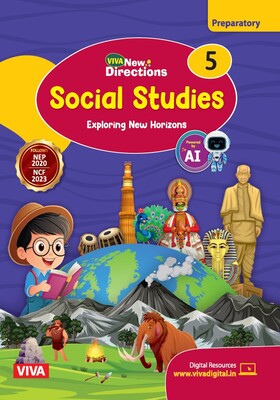Introductory Microeconomic Theory: A Textbook for Class XI
Introductory Microeconomic Theory: A Textbook for Class XI
(As per the Latest CBSE Syllabus)
₹375.00
Go to cartISBN: 9789387925106
Bind: Paperback
Year: 2018
Pages: 366
Size: 6 x 9 Inch
Publisher: Viva Education
Exclusive Distributors: Viva Books
Sales Territory: Worldwide
Description:
Introductory Microeconomic Theory: A Textbook for Class XI is a comprehensive textbook that has been written as per the latest CBSE syllabus. The objective of writing this book is to offer students the means for grasping basic microeconomic principles through in-depth explanations of concepts and examples drawn from day-to-day life. Employing the Theory of Multiple Intelligence, this book provides enjoyable ways to learn the principles and concepts of Economics.
Key Features:
- In-text activities to develop higher order thinking skills
- Diagrams and tables to facilitate visual learning and illustrate concepts
- Examples that provide guidance for solving numerical problems
- Points to Remember to facilitate quick revision
- MCQs with answer keys to help students understand the concepts
- Challengers comprising a set of higher order thinking questions
- Mind Map in almost every chapter to help students remember key concepts
- Be an Examiner to enable students to gauge and appraise their own preparation status
- Project Work to familiarise students with various aspects and elements of the project, and guidelines for preparing the project reports
Target Audience:
Students of CBSE Class 11.
Contents:
Preface
CBSE Syllabus
Chapter 1: Introduction to Economics • Positive vs Normative Analysis • Microeconomics vs Macroeconomics • Basic Tools used in Economics • Points to Remember • Exercises
Chapter 2: Economic Problems • Basic Economic Problem • Central Problem of an Economy • Solution of the Central Problem in Different Economies • Other Problems of an Economy • Production Possibility Frontier • Points to Remember • Mind Map • Exercises • Be An Examiner
Chapter 3: Consumer's Equilibrium • Basic Concepts • The Law of Diminishing Marginal Utility • Consumer's Equilibrium under Utility Approach • Single Commodity Case • Consumer's Equilibrium under Utility Approach • Two Commodities Case • Indifference Curve Approach • Points to Remember • Mind Map • Exercises • Be An Examiner
Chapter 4: Demand • Basic Concepts • Determinants of Individual Demand • Demand Function • Market Demand • Movement vs Shift of the Demand Curve • Shape of the Demand Curve • Exceptions to the Law of Demand • Points to Remember • Mind Map • Exercises • Be An Examiner
Chapter 5: Elasticity of Demand • Different Demand Curves have Different Elasticities • Degrees of Elasticity • Measures for Calculating Elasticity of Demand • Proportionate or Percentage Method • Geometric or Point Method* • Relationship between Price Elasticity and Expenditure* • Factors Influencing Elasticity of Demand • Importance of Elasticity of Demand • Points to Remember • Mind Map • Exercises • Be An Examiner
*Not in new syllabus but useful for competitive examinations
Chapter 6: Theory of Production • What is Production • • Production Function • Basic Concepts • Relationship Between the Product Curves • Law of Variable Proportions • Points to Remember • Mind Map • Exercises • Be An Examiner
Chapter 7: Theory of Costs and Revenue • Theory of Costs • Costs in the Short Run • Relationship between TC, ATC and MC curves • Theory of Revenue • Relationship of TR, AR and MR under Different Pricing Scenarios • Producer's Equilibrium • Break-Even Analysis • Points to Remember • Mind Map • Exercises • Be An Examiner
Chapter 8: Supply • Basic Concepts • Factors Determining Supply • Supply Function • Market Supply • Movement vs Shift of the Supply Curve • Shape of the Supply Curve • Exceptions to the Law of Supply • Points to Remember • Mind Map • Exercises • Be An Examiner
Chapter 9: Elasticity of Supply • Different Supply Curves have Different Elasticities • Degrees of Elasticity • Measures for Calculating Elasticity of Supply • Proportionate or Percentage Method • Geometric Method* • Factors Influencing Elasticity of Supply • Points to Remember • Mind Map • Exercises • Be An Examiner
*Not in new syllabus but useful for competitive examinations
Chapter 10: Market Equilibrium • Equilibrium Price and Quantity under Perfect Competition • Determination of Equilibrium Price • Effects of a Change in Demand and Supply on the Equilibrium Price • Effect of Government Intervention on Equilibrium Price • FAD Theory • Economically Unviable Industry • Points to Remember • Mind Map • Exercises • Be An Examiner
Chapter 11: Forms of Markets • Bases for Market Differentiation • Perfect Competition • Shape of the AR and MR Curves • Monopoly • Monopolistic Competition • Oligopoly • Points to Remember • Mind Map • Exercises • Be An Examiner
Solutions to In-text Activities
Answer Key for MCQs
Project Work
About the Author:
Mrs. Ambika Gulati graduated from St. Stephens College (Delhi University), New Delhi and thereafter completed her Masters from St. John's College, University of Cambridge, UK. She is a gold medalist from the University of Delhi in the M.Ed. Programme. She joined Sanskriti School, Delhi in 2000, and remained the Head of the Economics Department till 2008, introducing many pioneering methodologies in the classroom. She has worked with several government educational bodies on various committees related to Economics. Mrs. Gulati has authored books on Economics and conducted several workshops for teachers in the NCR. Formerly, she was the Principal of DPS Academy, Dubai (United Arab Emirates). At present, she is the Principal of The Millennium School, Dubai.







